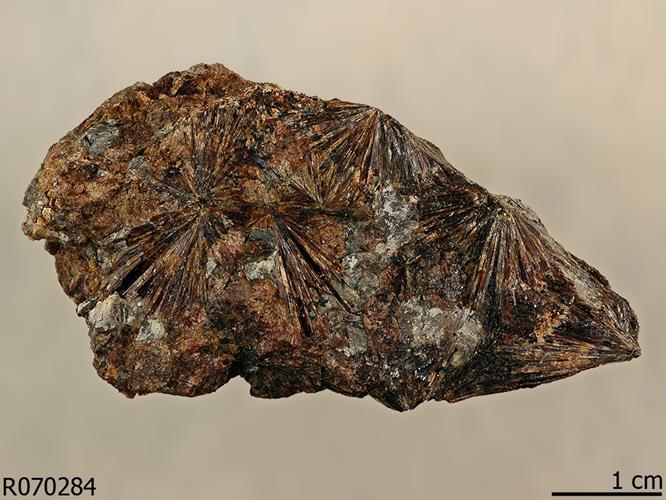Lamprophyllite - (Na,Mn2+)3(Sr,Na)2(Ti,Fe3+)3(Si2O7)2O2(OH,O,F)2
Named after the Greek words lampro and phyllo, meaning "shining" and "leaf" respectively, in reference to the mineral’s lustrous, leaf-like sheets that make up its cleavage planes. Lamprophyllite is a rare, but widespread mineral in alkaline rocks. It was first described from Kola Peninsula, Russia. Lamprophyllite is a complex group of sorosilicates with the general chemical formula given as A2B4C2Si2O7(X)4, where the site A can be occupied by Sr, Ba, Na and K; B is occupied by Na, Ti, Fe, Mn, Mg and Ca. The site C is mainly occupied by Ti or Fe3+ and X includes the anions F-, OH- and O2-.Optical properties:
• Form: Flattened and elongated crystals, often as stellate clusters.
• Cleavage: Micaceous.
• Color: Dark brown, brownish yellow.
• Pleochroism: From orange to yellow.
• Birefringence: High.

Stellate clusters of lamprophyllite. Lovozero, Kola, Murmanskaja Oblast', Russia. From RRUFF.
Bibliography
• Cox et al. (1979): The Interpretation of Igneous Rocks, George Allen and Unwin, London.
• Howie, R. A., Zussman, J., & Deer, W. (1992). An introduction to the rock-forming minerals (p. 696). Longman.
• Le Maitre, R. W., Streckeisen, A., Zanettin, B., Le Bas, M. J., Bonin, B., Bateman, P., & Lameyre, J. (2002). Igneous rocks. A classification and glossary of terms, 2. Cambridge University Press.
• Middlemost, E. A. (1986). Magmas and magmatic rocks: an introduction to igneous petrology.
• Shelley, D. (1993). Igneous and metamorphic rocks under the microscope: classification, textures, microstructures and mineral preferred-orientations.
• Vernon, R. H. & Clarke, G. L. (2008): Principles of Metamorphic Petrology. Cambridge University Press.


.jpg)
.jpg)
.jpg)
.jpg)
.jpg)
.jpg)
.jpg)
.jpg)
.jpg)
.jpg)